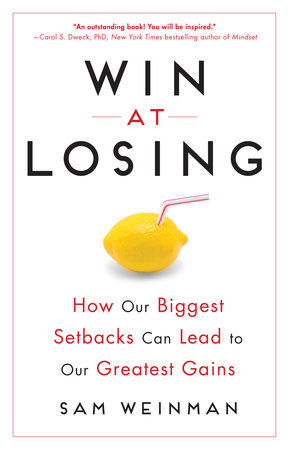Win at Losing: How to Help Kids See Success in Their Failures
by Sam Weinman
I used to have a swearing problem. I wouldn’t call it a huge problem. I was not someone who you would be reluctant to introduce to your favorite clergy member. When pressed, I could mostly function as a rational person.
But put me on a tennis court when I was a kid and, well, let’s just say I wouldn’t have invited your favorite clergy member to one of my tennis matches. My darker instincts took over. When I missed shots, I muttered under my breath. When I missed several shots in a row, I invented colorful ways to call myself an idiot. If I lost, which I did often, my racket was prone to flying mysteriously out of my hand.
The great misconception about me writing a book focused on the merits of losing is that I wrote it having always been able to put losing in its proper perspective. In fact, I wrote it as someone who used to wrap his entire self-worth in the most inconsequential of events. In setting out to describe how losing can have real benefits, the working premise was to prove as much to my two young boys — but not far behind was the need to reinforce it to myself.
Having experienced this dynamic from both sides — as a petulant young athlete and (slightly) more enlightened father — I’ve developed a unique understanding of the corrosive effects of losing, and how easily this negativity can weigh on our psyches. But as someone who also had plenty of practice losing, I began to see it as an asset.
In my book, Win at Losing, I spend a fair amount of time describing people who profited from loss by putting the lessons of those experiences to good use. A governor who lost his re-election campaign became a more effective leader once he accepted the mistakes of his first term. An actress who kept losing out on an Emmy award recognized a small tic in her performances that she was able to correct. All of these examples illustrate one of the book’s central themes: Failure and loss are often the clarifying episodes we need to grow and learn.
But in the absence of a gift-wrapped lesson, an effective tool in helping kids develop a healthy attitude toward losing is to simply let them lose often. It doesn’t matter the forum — tennis matches, math tests, tryouts for the school play. The more one is exposed to the sensation of failure, the better one is able to understand that a failure needn’t be a defining moment.
Psychologists use the phrase “microfailure” to describe the inevitable hiccups that we confront in our day-to-day existence. The “failure” part of that word is self-evident, but it’s the “micro” that requires some perspective. In the same way a year can feel like a mere blip to someone in their 80s, your failures start to recede in magnitude when there are enough of them to point to. With kids like mine, the message isn’t that they’re necessarily destined for a life of perpetual failure. But in gently shifting their attention to the next game, the next season, or the next tryout, I’m reminding them that the world continues to turn in the aftermath of setbacks.
The more kids are able to see these events on a larger continuum, the more willing they’ll be to try to learn from the experience. The Stanford psychology professor Carol S. Dweck famously called this the difference between a “growth mindset,” in which we’re willing to embrace challenge even in the face of failure, and a “fixed mindset” that only seeks validation of one’s abilities and talents.
We want our kids to have growth mindsets. We want them to see their three strikeouts this game as a springboard for the next game; or a “C” on a test not as a commentary on their intelligence, but as a reminder to study harder. If it sounds simple in the abstract but more complicated in reality, perhaps start with what goals you’re setting for your kids in the first place. In Dweck’s view, the emphasis should always be on effort over ability and process over results.
“This growth mindset is based on the belief that your basic qualities are things you can cultivate through your efforts,” Dweck writes in her influential book Mindset. “Although people may differ in every which way — in their initial talents and aptitudes, interests, or temperaments — everyone can change and grow through application and experience.” The emphasis on effort with our kids means we’re better able to point to success even in games they technically “lost,” helping them to see that all of these microfailures can serve them in the long run.
Given enough time and experience, your kids can come to realize that most of their setbacks are as fleeting as a cloudy day. It doesn’t matter if they’re running for political office or just hitting a bunch of backhands into the net. The recurrence of failure won’t better equip them to avoid disappointment — but it will provide the perspective to not let disappointment stay with them very long.
-
Learn More About the Book:
Win at Losing: How Our Biggest Setbacks Can Lead to Our Greatest GainsAvailable from:Also available from:

